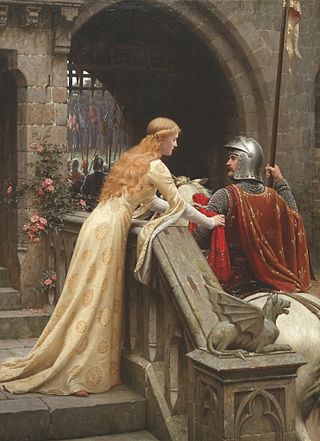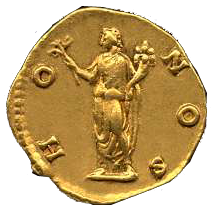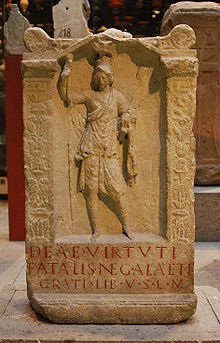
Lucius Sergius Catilina, known in English as Catiline, was a Roman politician and soldier best known for instigating the Catilinarian conspiracy—a failed attempt to seize control of the Roman state in 63 BC.

Courage is the choice and willingness to confront agony, pain, danger, uncertainty, or intimidation. Valor is courage or bravery, especially in battle.

Honos or Honor was the Roman god personifying honor. He was closely associated with Virtus, the goddess of manliness, or bravery, and the two are frequently depicted together. Honos is typically shown wearing a chaplet of bay leaves, while Virtus is identified by her helmet.

Pietas, translated variously as "duty", "religiosity" or "religious behavior", "loyalty", "devotion", or "filial piety", was one of the chief virtues among the ancient Romans. It was the distinguishing virtue of the founding hero Aeneas, who is often given the adjectival epithet pius ("religious") throughout Virgil's epic Aeneid. The sacred nature of pietas was embodied by the divine personification Pietas, a goddess often pictured on Roman coins. The Greek equivalent is eusebeia (εὐσέβεια).

In ancient Roman religion, Virtus was the deity of bravery and military strength, the personification of the Roman virtue of virtus. The Greek equivalent deity was Arete. The deity was often associated with the Roman god Honos and was often honoured together with him, such as in the Temple of Virtus and Honos at the Porta Capena in Rome. It was after the conquest of Syracuse in 205 that the Virtus portion of the temple was added, and in such a way that one had to enter the temple of Virtus before Honos, symbolizing that honor cannot be obtained without military success.

Gaius Sallustius Crispus, usually anglicised as Sallust, was a historian and politician of the Roman Republic from a plebeian family. Probably born at Amiternum in the country of the Sabines, Sallust became a partisan of Julius Caesar, circa 50s BC. He is the earliest known Latin-language Roman historian with surviving works to his name, of which Conspiracy of Catiline on the eponymous conspiracy, The Jugurthine War on the eponymous war, and the Histories remain extant. As a writer, Sallust was primarily influenced by the works of the 5th-century BC Greek historian Thucydides. During his political career he amassed great and ill-gotten wealth from his governorship of Africa.

The mos maiorum is the unwritten code from which the ancient Romans derived their social norms. It is the core concept of Roman traditionalism, distinguished from but in dynamic complement to written law. The mos maiorum was collectively the time-honoured principles, behavioural models, and social practices that affected private, political, and military life in ancient Rome.
Gravitas was one of the ancient Roman virtues that denoted "seriousness". It is also translated variously as weight, dignity, and importance and connotes restraint and moral rigor. It also conveys a sense of responsibility and commitment to the task.
Novus homo or homo novus was the term in ancient Rome for a man who was the first in his family to serve in the Roman Senate or, more specifically, to be elected as consul. When a man entered public life on an unprecedented scale for a high communal office, then the term used was novus civis or "new citizen".
Gaius Volusenus Quadratus was a distinguished military officer of the Roman Republic. He served under Julius Caesar for ten years, during the Gallic Wars and the civil war of the 40s. Caesar praised him for his strategic sense and courageous integrity.
Humanitas is a Latin noun meaning human nature, civilization, and kindness. It has uses in the Enlightenment, which are discussed below.

Civic virtue is the cultivation of habits important for the success of a society. Closely linked to the concept of citizenship, civic virtue is often conceived as the dedication of citizens to the common welfare of each other even at the cost of their individual interests. The identification of the character traits that constitute civic virtue has been a major concern of political philosophy. The term civility refers to behavior between persons and groups that conforms to a social mode, as itself being a foundation of society and law.
Dignitas is a Latin word referring to a unique, intangible, and culturally subjective social concept in the ancient Roman mindset. The word does not have a direct translation in English. Some interpretations include "dignity", which is a derivation from "dignitas", and "prestige", "charisma" and "power from personal respect".

Auctoritas is a Latin word that is the origin of the English word "authority". While historically its use in English was restricted to discussions of the political history of Rome, the beginning of phenomenological philosophy in the 20th century expanded the use of the word.
Marcus Marius Gratidianus was a Roman praetor and supporter of Gaius Marius during the civil war between the followers of Marius and Lucius Cornelius Sulla. As praetor, Gratidianus is known for his policy of currency reform during the economic crisis of the 80s BC.

Pro Roscio Amerino is a defence speech given by Marcus Tullius Cicero on behalf of Sextus Roscius, a Roman citizen from the municipality of Amelia accused of murdering his father. Delivered in 80 BC, it was Cicero's first major public case. It is also his second-earliest surviving speech.
Gaius Valerius Troucillus or Procillus was a Helvian Celt who served as an interpreter and envoy for Julius Caesar in the first year of the Gallic Wars. Troucillus was a second-generation Roman citizen, and is one of the few ethnic Celts who can be identified both as a citizen and by affiliation with a Celtic polity. His father, Caburus, and a brother are named in Book 7 of Caesar's Bellum Gallicum as defenders of Helvian territory against a force sent by Vercingetorix in 52 BC. Troucillus plays a role in two episodes from the first book of Caesar's war commentaries, as an interpreter for the druid Diviciacus and as an envoy to the Suebian king Ariovistus, who accuses him of spying and has him thrown in chains.
Lucius Quinctius was a politician of the late Roman Republic. A homo novus associated with the populares, he was tribune of the plebs in 74 BC and praetor in 67 BC.

The Catilinarian conspiracy, sometimes Second Catilinarian conspiracy, was an attempted coup d'état by Lucius Sergius Catilina (Catiline) to overthrow the Roman consuls of 63 BC – Marcus Tullius Cicero and Gaius Antonius Hybrida – and forcibly assume control of the state in their stead.
The Temple of Honor and Virtue was a temple in Regio I of ancient Rome dedicated to Virtus and Honos. No remains survive. It is the first entry for Regio I in the regional catalogues and was sited just outside the porta Capena, probably on the northern side of the via Appia. In front of it was the Ara Fortuna Redux.












